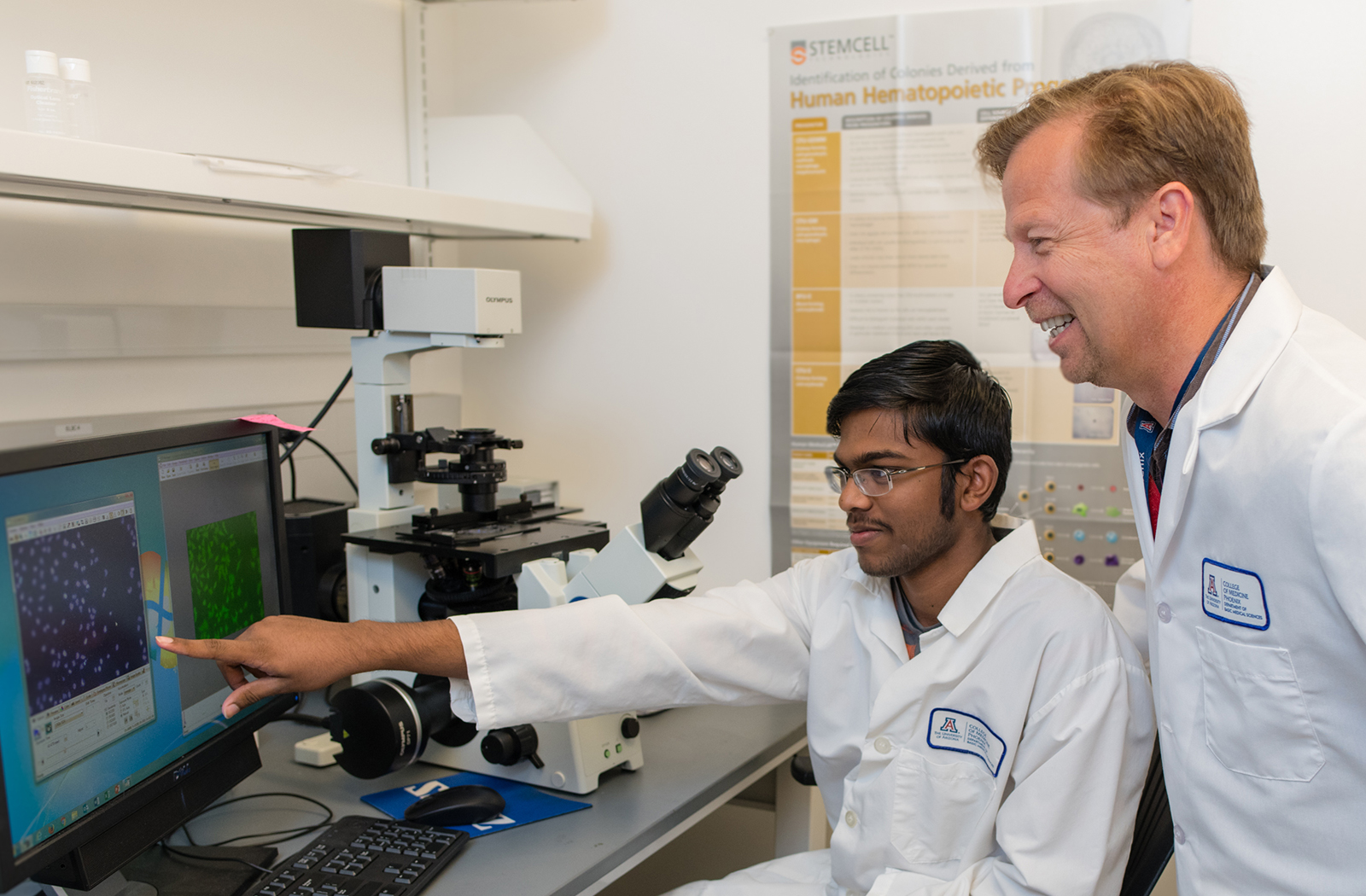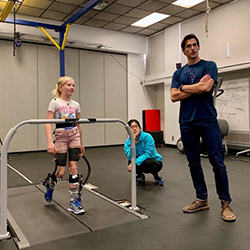
Valley Research Partnership Announces Fifth Round of Funding

The Valley Research Partnership (VRP) has awarded more than $240,000 in grants to clinicians, scientists and students who are improving health care in the Phoenix area.
Ten research projects were awarded funding by the VRP — a program developed by the University of Arizona College of Medicine – Phoenix, Dignity Health St. Joseph’s Hospital and Medical Center, Valleywise Health, Banner – University Medical Center Phoenix and Phoenix Children’s Hospital — to fund collaborative and training grants. Grants went into effect on July 1, 2020.
This is the VRP’s fifth round of funding. Since inception, the VRP has awarded more than $1.8 million to 58 research projects. Collectively, these grants have led to more than 42 publications and 34 extramural grant submissions.
“Through the support of the College of Medicine – Phoenix and Phoenix metro hospitals, the VRP offers trainees and faculty investigators grants to support their studies and provide a funding stream for projects prior to seeking national funding,” said Paul Boehmer, PhD, interim associate dean for research at the college.
The VRP grants also help prepare and teach early investigators — such as residents, fellows and medical students — about grant writing and the process of putting together a proposal. “This may be the first proposal that these trainees put together, and we hope there are many more to come,” Dr. Boehmer said.
There are three funding mechanisms for the VRP, which includes grants for trainee projects, medical student scholarly projects and collaborative projects between two investigators from different VRP partnering institutions.
New this year, the VRP provided funding for three medical student’s scholarly projects. Dr. Boehmer says that this new mechanism promotes scholarship of medical students, which is of strategic importance.
One of those projects includes Ben Conner’s research. Conner is an MD/PhD student and is helping children with cerebral palsy improve their mobility by having them train using a robotic exoskeleton.

This grant provides specific funding for a "control phase" in their study, where they will gather baseline metrics for participants. This control phase will have subjects complete a matched amount of time walking, but without the exo-therapy, to develop a standard for which future interventions can be compared against.
“This crossover design, which has been made possible with VRP funding, will allow us to determine the true effects of exo-therapy, adding efficacy and rigor to our findings, which is essential for eventual translation out of the lab. We are thankful to have received the award,” Conner said.
Kurt Gustin, PhD, an associate professor in the Department of Basic Medical Sciences at the College of Medicine - Phoenix, and Rita Sattler, PhD, an associate professor of Neurology at the college and researcher at Dignity Health St. Joseph’s Hospital and Medical Center, were awarded a collaborative project grant of $50,000 to study the impact of viral infection on ALS disease pathogenesis.
“The VRP grant allows us to pursue a novel question looking at the impact of mutations associated with Amyotrophic lateral sclerosis (ALS, also known as Lou Gehrig’s Disease) on the host antiviral response and to determine if viral infection of individuals with these mutations contributes to the development of ALS,” Dr. Gustin said.
Mutations associated with the development of ALS occur in genes that have been implicated in defending the host from viral infection. This raises the possibility that people with these mutations may be at greater risk for infection by viruses. Similarly, virus infection of individuals harboring these mutations may contribute to the development of disease pathology. Dr. Gustin and Dr. Sattler’s research examines these possibilities by comparing virus replication in cells with and without these mutations and examining markers for the antiviral response and ALS disease.
“If our hypothesis is correct, this research will provide a better understanding of the impact of ALS mutations on the antiviral response and identify roles for viral infection in the development of ALS disease,” Dr. Gustin said. “This information can be used to develop new strategies to slow the development of ALS and may have implications for other neurodegenerative disorders such as Huntington’s and Myotonic Dystrophy.”
Brian Appavu, MD, an assistant professor of Neurology and a neurologist at Barrow Neurological Institute at Phoenix Children’s Hospital and Asim Haque, MD, PhD, MPH, an assistant professor of Neurology and a neurologist at Dignity Health St. Joseph’s Hospital and Medical Center, were awarded a collaborative project grant of $50,000 to study the electroencephalographic signatures of consciousness after acute brain injury.
After patients experience acute brain injury, they can appear unresponsive for long periods of time, making it hard to figure out whether they are in a coma that they may never recover from. Dr. Appavu and Dr. Haque’s research will allow them to look for signs of brain activity to see if some of these unresponsive patients may have “covert consciousness” in which they may not be able to move or respond overtly, but may be able to have some awareness of their surrounding environment. They will also explore whether the presence of these brain signals may help them understand who might recover from coma.
“After patients become comatose after acute brain injuries, their families have to make difficult decisions regarding whether to withdraw aggressive medical support on their loved ones, or whether to wait and see if they emerge from coma,” Dr. Appavu said. “Even if they do decide to pursue palliative measures, families may feel assurance knowing that their loved ones were able to experience their presence in their final hours.
“We hope the work arising from this project will allow physicians to improve the way they prognosticate recovery from brain injuries, and allow families to have a better understanding of what their critically ill loved ones are experiencing."
Round Five Awardees
| Investigator Names | Type | Title of the Project | Funding |
|---|---|---|---|
|
Michael Fallon, MD – U of A College of Medicine – Phoenix, Chair, Department of Medicine |
P2 |
Bone morphogenetic protein 9: A novel liver-derived mediator of lung vascular changes in hepatopulmonary syndrome |
$50,000 |
| Kurt Gustin, PhD – U of A College of Medicine – Phoenix, Associate Professor, Department of Basic Medical Sciences Rita Sattler, PhD – Barrow Neurological Institute at Dignity Health St. Joseph's Hospital and Medical Center, Associate Professor of Neurobiology and Neurology |
P2 |
Interplay between C9orf72 ALS and neurotropic viruses: Impact on viral and ALS disease pathogenesis |
$49,640 |
| Brian Appavu, MD – Barrow Neurological Institute at Phoenix Children's Hospital, Clinical Assistant Professor of Neurology Asim Haque, MD, PhD, MPH – Barrow Neurological Institute at Dignity Health St. Joseph's Hospital and Medical Center, Assistant Professor of Neurology |
P2 |
Electroencephalographic Signatures of Consciousness after Acute Brain Injury |
$50,000 |
| Sofiyan Saleem, PhD – U of A College of Medicine – Phoenix, Research Assistant Professor, Department of Internal Medicine Ashley Stokes, PhD – Barrow Neurological Institute at Dignity Health St. Joseph's Hospital and Medical Center, Assistant Professor, Department of Imaging Research |
P2 |
A Highly Specific Inhibitor of Matrix Metalloproteinase-9 Abrogates Tissue Plasminogen Activator Mediated Hemorrhagic Transformation in Experimental Ischemic Stroke |
$50,000 |
|
Theresa Thomas, PhD – Barrow Neurological Institute at Phoenix Children's Hospital, U of A College of Medicine – Phoenix, Associate Professor, Department of Child Health |
P1a |
Traumatic brain injury induced blood brain barrier permeability and impaired neurotransmission are mediated by FBN1 mutation in MFS mice |
$10,000 |
|
Amelia Gallitano, MD, PhD – U of A College of Medicine – Phoenix, Professor, Department of Basic Medical Sciences, Department of Psychiatry |
P1a |
Elucidating the neurobiological and molecular mechanisms underlying the therapeutic benefit of electroconvulsive therapy |
$10,000 |
|
Rayna Gonzales, PhD – U of A College of Medicine – Phoenix, Associate Professor, Department of Basic Medical Sciences |
P1a |
S1PR1 regulation of brain endothelial dysfunction and barrier properties using an in vitro model of ischemic stroke |
$10,000 |
| Zachary Lerner, PhD – U of A College of Medicine – Phoenix, Assistant Professor, Department of Orthopedics Benjamin Conner – U of A College of Medicine – Phoenix, MD/PhD Student |
P1b |
A controlled-trial of wearable adaptive resistance and investigation of its effects on muscle architecture of the ankle plantar flexors in children with cerebral palsy |
$5,000 |
| Taben Mary Hale, PhD – U of A College of Medicine – Phoenix, Associate Professor, Department of Basic Medical Sciences Alexis Bailey – U of A College of Medicine – Phoenix, Medical Student |
P1b |
Impact of transient ACE inhibition on TGF beta signaling in response to angiotensin II |
$5,000 |
| Arash Sabati, MD – Phoenix Children's Hospital, Associate Professor, Department of Child Health, Division of Cardiology Jason Jorgensen– U of A College of Medicine – Phoenix, Medical Student |
P1b | 3D modeling comparison of Pectus Excavatum to the Haller Index | $4,590 |
About the College
Founded in 2007, the University of Arizona College of Medicine – Phoenix inspires and trains exemplary physicians, scientists and leaders to advance its core missions in education, research, clinical care and service to communities across Arizona. The college’s strength lies in our collaborations and partnerships with clinical affiliates, community organizations and industry sponsors. With our primary affiliate, Banner Health, we are recognized as the premier academic medical center in Phoenix. As an anchor institution of the Phoenix Bioscience Core, the college is home to signature research programs in neurosciences, cardiopulmonary diseases, immunology, informatics and metabolism. These focus areas uniquely position us to drive biomedical research and bolster economic development in the region.
As an urban institution with strong roots in rural and tribal health, the college has graduated more than 1,000 physicians and matriculates 130 students each year. Greater than 60% of matriculating students are from Arizona and many continue training at our GME sponsored residency programs, ultimately pursuing local academic and community-based opportunities. While our traditional four-year program continues to thrive, we will launch our recently approved accelerated three-year medical student curriculum with exclusive focus on primary care. This program is designed to further enhance workforce retention needs across Arizona.
The college has embarked on our strategic plan for 2025 to 2030. Learn more.